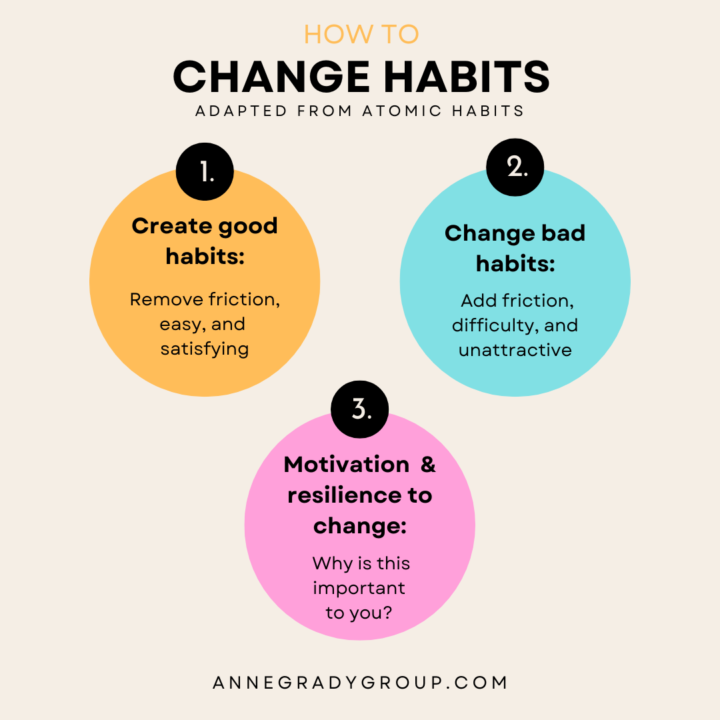Behave your way to better
Behave your way to better
Behave your way to better
Are you a resolution maker?
At one point or another, most of us have set New Year’s resolutions. We’ve made the decision to eat better, get healthy, and go to the gym, but by February, we’ve got a beer in one hand and a cheeseburger in the other. We went to the gym and that hurt — not doing that again! We try to make drastic changes, only to end up making no change at all. Why? Because changing habits happens one of three ways: Slowly, rarely, or never.
Your habits are nothing more than cognitive shortcuts, allowing you to conserve mental energy. After all, if you had to think really hard about putting on shoes, eating, taking a shower, or getting dressed, you would be exhausted by 9:00 AM. Your brain conserves energy by taking anything you repeatedly think, say, or do, and turning it into a habit.
Try something. Cross your arms.
Now cross them in the opposite direction. The second time probably felt more clunky and awkward, and that’s because it happened from a different part of your brain than the first. The first was a habit, the second required a little thought.
Think of your brain like a field full of grass. You can walk through the field, but the grass will still pop back up. You may have to walk the exact same path a hundred times before a pathway is carved. And just because you carve new pathways doesn’t mean the old ones aren’t still well-worn and comfortable. Old bumpy paths that we know can be more comfortable than the smooth ones we don’t.
Your neural pathways have been deeply carved, and it takes repetitive, consistent change to build new ones. And just because you develop a new neural pathway does not mean old ones are erased—which means it’s easy to slip back into old habit patterns.
Unfortunately, your brain doesn’t know the difference between the habits that help you or those that undermine your success and happiness. Building your resilience buffer zone requires that you be deliberate about cultivating the habits that will lead to the life you want. Rather than inspiration or motivation, you have to behave your way to better.
Recipe #3: Cultivate habits that build your resilience buffer zone.
How to practice: Create two lists. For the first list, identify the habits that support the life you want. On the second list, identify the habits that get in your way. Here are a few of my examples.
Daily Habits That Support Me:
– Practice gratitude while brushing my teeth.
– Take 30 minutes to wake up without news, social media, or email.
– Exercise 3-4 days a week.
Daily Habits That Sabotage Me:
– Ruminating about the past.
– Checking email after work hours.
– Eating unhealthy snacks.
As you go through your day and week, keep a collection of these habits. Rather than try to change everything at once, choose one of these two options:
1. Pick one habit that is helping you. How can you incorporate more of it into your daily routine?
2. Pick one habit that is sabotaging you. How can you do less of it or create friction to make it harder to do?
Rather than making a drastic change, this allows you to make subtle changes and experience small wins. When you stop to acknowledge the “wins”, you get a surge of dopamine, giving you the energy and motivation to keep going.
If you choose to do more of something, how can you integrate it into things you already do so that it’s not one more thing on your to-do list (i.e. practicing gratitude while you brush your teeth)? If you choose to do less of something, how can you create friction so that it’s harder to do it? (i.e. not buying unhealthy snacks).
Big, sweeping changes may seem like the road to redemption, but our habits change because of consistent, repetitive behavior. Contrary to popular belief, changing habits is not about willpower or motivation. Every time you repeat a behavior or thought pattern, it becomes easier to think or behave that way. When we change our behavior, we change our habits and our lives.
Stay brave and resilient,
Anne

Subscribe to Anne's #ResilienceReset Email!
Anne breaks down the daily habits and skills needed to grow and cultivate RESILIENCE.
I had an incredible time chatting with @dr.cindyspeaks on Positively Altered about one of my favorite topics >> resilience!
💪 We covered everything from how stress affects the brain to actionable strategies for resetting your resilience and reclaiming balance. Plus… we even talked donkeys!
🎧 Listen here: https://podcasts.apple.com/us/podcast/episode-23-the-resilience-reset-transforming-stress/id1773804535?i=1000699134975
In this episode, we dive into:
🧠 How to train your brain for resilience
😩 The power of sitting in the “suck”
💡 Simple strategies to reset stress and find balance
If you’re ready to transform stress into strength, this one’s for you!
What is on your to-do list for the week? ✅
I’m sure it includes meetings, tasks, personal chores, and follow-ups, but does it include things that bring you joy?
Instead of waiting for happiness, create it.. You can even focus on enjoyable things while doing the have-to do things.
Slogging through paperwork? Light a candle and listen to your favorite tunes.
Going for a drive? Listen to a stand-up comic or a great book.
Don’t neglect what brings you joy and happiness—make it a ritual and part of your resilience-building routine.
You know that heart-stopping moment when you try to change lanes, only to realize that someone is in your blind spot?
Blind spots aren’t just for driving. In life and leadership, we all have blind spots—things others see clearly that we don’t.
The tricky part? Blind spots aren’t always glaring flaws. Often, they’re our good intentions getting lost in translation. So, how do you uncover them?
Here’s a simple twist that will make a big difference: Ask for advice instead of feedback. 🗣
This slight shift makes people more likely to offer constructive, actionable insights—without triggering defensiveness. Plus, it builds trust and strengthens relationships.
Rather than trying to make drastic changes, pick one behavior and integrate it into your day.
Want to start a gratitude practice? Do it while you brush your teeth. Want to take deep breaths? Practice while you make coffee. Adding a new habit to an existing one makes it easier to stick with it.
#mindfulmonday #habitstacking #atomichabits #jamesclear
Humor changes your biochemistry, emotions, thoughts, and behavior. 😆
A positive mood boosts your immune system! Whether you find your laughter through being around friends, going to a comedy show, watching funny movies, or just being goofy, don’t underestimate the power of a belly laugh and a sense of humor.

Anne Grady is a Speaker, Author, and #TruthBomb Dropper.
Anne shares practical strategies that can be applied both personally and professionally to improve relationships, navigate change, and triumph over adversity. And she’ll make you laugh while she does it. Anne is a two time TEDx speaker, and her work has been featured in numerous media outlets, including Harvard Business Review, Entrepreneur, Forbes, Fast Company and Inc. magazines, CNN, ESPN, and FOX Business. She is the best selling author of 52 Strategies for Life, Love & Work and Strong Enough: Choosing Courage, Resilience and Triumph.


